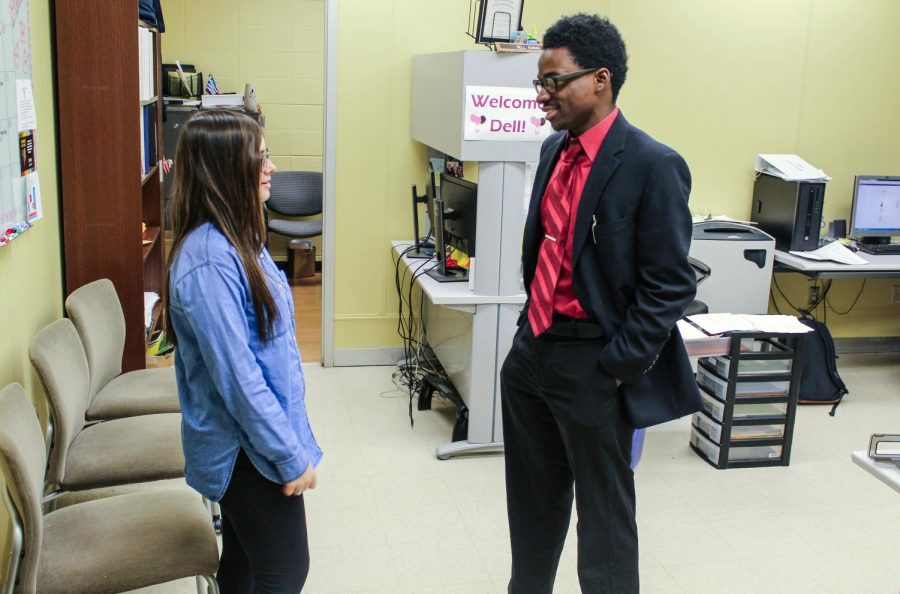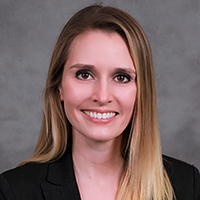Behind-the-scenes with SGA
Student government moves forward with promises, elections
Daquan Williams (left), SGA president and junior communication major, speaks with Brett Gawel, graduate student of biology, about student issues.
As Daquan Williams finishes his first year as SGA president, his two major goals have been adapted from the original ideas and a variety of side projects are in the works.
When Williams became president, the two goals he announced were installing 24-hour study areas for students and displaying flags from different countries in a high-traffic area to remind international students of their homes. Williams said he is fine with the compromises he has discussed with the university’s administration.
“Nothing is ever black and white. I’ll just continue to talk to administration and hopefully we can come to a solution that best helps students,” Williams said.
Williams said he proposed the installation of 24-hour study areas to Stephen Turner, vice chancellor for Finance and Administration, but they could not be placed in any of the existing buildings on the Hammond campus due to security reasons. Turner confirmed that the design of the BioScience building is nearly complete and includes open student-collaboration spaces, although no decisions have been made regarding the hours of operations. Williams said discussions are still taking place regarding these spaces for students on the Westville campus.
Williams proposed the idea of various flags being placed in SULB on the Hammond campus to Carmen Panlilio, vice chancellor for Enrollment Services and Student Affairs. He said that now they are considering placing a touchscreen TV in the Welcome Center in SULB where students can find out facts about the country of a flag that is on display. This decision was made due to the how costly maintenance of flags would have been, Williams said.
Williams said the third biggest project SGA has been working on during the year has been the creation of a House of Representatives. Currently, SGA is in the process of finalizing how the new branch would work in terms of application process, membership requirements, number of seats and specific duties. Once these items are finalized, the Senate will vote to pass the new branch.
In an effort to increase student involvement in SGA’s decisions, the organization bought suggestion boxes to be placed around both campuses in approved locations by facilities. Three boxes will be placed on each campus.
“They will be going up soon, and we look forward to hearing input from students to see what things are important to them and what we should be looking to work towards,” Williams said.
One of the more long-term projects SGA is looking to complete is the development of a system where students can share information about professor’s teaching styles, Williams said.
“The idea is that it will give students options for courses with more than one section, taught by multiple professors. It’s to make sure students are getting a faculty member that fits their personality,” Williams said.
He said some of the ratings that are being proposed are professors that use the entire time to lecture versus interactive teaching methods, whether or not online homework is assigned and how often professors use Blackboard.
The organization also began accepting leadership funds applications in the fall, which are small amounts of money granted to student organizations for their members to attend conferences. Williams said four organizations have applied since then and that the announcements for awarded funds should begin in the spring.
Meg Rincker, SGA adviser, said she believes SGA accomplished great things throughout the year and looks forward to seeing the difference the leadership and professionalism of the students’ work will produce.
“Because we have really dedicated and hard-working students, they are also working on how to make SGA better as well: being the student voice at a major university, events like Welcome Week, homecoming and Founder’s Day, installing suggestion boxes across campus, amending the bylaws, and preparing for spring elections,” Rincker said.
Rincker hopes their current work will encourage others to want to run and vote in the current election. Williams said he thinks his year as president was efficient.
“It’s surreal how well it went. We were very proactive and tried to stay on top of things. We had a very active senate, who worked well on their own and only needed my guidance. I would say it’s been a great year,” Williams said.
Williams has not announced whether he will be running in the current election.



